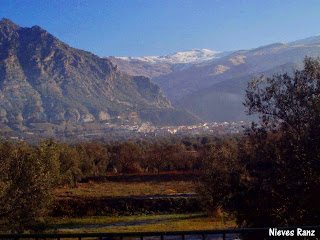When Muslims
arrived, in the seventh century, to a country called “Hispania”, attracted by
rumours of riches and treasures, they discovered a fertile paradise valley,
located in a basin bordered by mountains. That place had everything they
cherished: good soil, rivers that ran freely and the natural protection of
their mountains, so they stayed there.
Captivated
by its beauty, they called it The Lecrin Valley (or "Valley of Joy Granada
In
addition, in that valley people lived happily for a long time, until at the end
of the fifteenth century, they went into exile in North
Africa , expelled by the Catholic Monarchs in the Reconquer Wars.
More than
five hundred years after this garden full of crops and fruits, still retains
its Moorish essence. In this valley, a heady fragrance of orange blossoms and
lemon trees scent the air in spring. In addition, old flourmills, Muslims castles,
canals and charming cottages, spread
over this entire quiet and bright region. It also enjoys a real
microclimate, where there is little rainfall.
The Lecrin Valley
is just 25 minutes from Granada going to the north
and if you take the opposite direction, you can get to the Tropical Coast Sierra Nevada
heading east. In addition, in less than an hour you can visit the villages of the Alpujarra. Therefore, for
all this, its situation is magnificent and privileged.
This land
and the villages and people who live in them (there are 23 villages), still remains
serene and beautiful, receiving each year thousands of visitors from around the
world, who want to find the authenticity of the simple life where one has the
impression that time has stopped there.
Their
houses are whitewashed inside and out, with this typical whiteness of all
Andalucia, with a closed structure and the houses attached to each other
forming blocks that are separated by narrow lanes.
Besides
being an ideal place for relaxation and rest, so is to live fully the nature
performing a wide range of activities such as gliding, horseback riding, hiking
through rivers and mountains, cycling or practicing birds watching. In
addition, very close to the valley you can ski in Sierra Nevada, play golf or
practise scuba diving, snorkelling or surfing in the nearby waters of the Mediterranean Sea .
You can
also make many different cultural routes, visiting their mills, orchards and
castles, as well as visiting local festivals or open-air markets of farmers and
artisans, enjoying its art and gastronomy, among many other activities. Not to
mention the nearby city of Granada , where
so many attractions are offered, the first of which is the world famous Alhambra Palace
And among all
those Muslims castles, there is that of Mondújar, where the Nazaries Kings of
Granada, were buried and where it is believed that the last burial which was
held, was of Morayma, wife of Boabdil.
Morayma,
the last Moorish queen, was born in Loja (west of Granada
At 15 she
married Boabdil, in a royal wedding with great pomp and joy, surely one of the
few happy moments of his life. According to historians, she was a beautiful
woman with big eyes and sweet face.
A few days
after the wedding, Mulay Hacén (Boabdil’s father) imprisoned his son,
separating him from his young wife and locking her in a Carmen (house with
garden and orchard) in Granada
Meanwhile
all of this happened, Morayma lived with her mother in law, Aixa, a resentful
and spiteful woman, due to the neglect of her husband, who fell into the arms
of his new favourite, Zoraida (a Christian woman named Isabel de Solis) who would
become his second wife. For this reason, Aixa was constantly encouraging his
son to fight against his father.
It is said that
one day Morayma consulted a wise astrologer, very famous in the kingdom, about
the horoscope of King Boabdil. And the old man replied: "The stars say that
the last Mazarin King will live long but also he will suffer a lot".
When she
was 26 years old, shortly before her husband went into exile in Fez (Morocco village
of Mondujar
Surely Boabdil
loved her loyal and faithful wife very much, since after leaving for the exile he
never got married again.
It is very paradoxical
that this queen, whose life was not nearly as sweet as a fairy tale, it is
finally resting somewhere in the beautiful “Valley of Joy”, a place where Muslims were
captivated and enthralled for centuries. And when you visit it some time, then you will realise
and understand why .....











It romantics story and yet very sad, the truth is personally like to be queen for a day no more.
ReplyDeleteIn life everything had a price.
We live better, without official acts pressures, persecuted and escorted.
Being independent, no one will know, lead a quiet life and peaceful.
Yes MADRILEÑA, many times it happens that money and power don't bring happiness and even less don't bring freedom, which is something much more important than power and money.
Delete